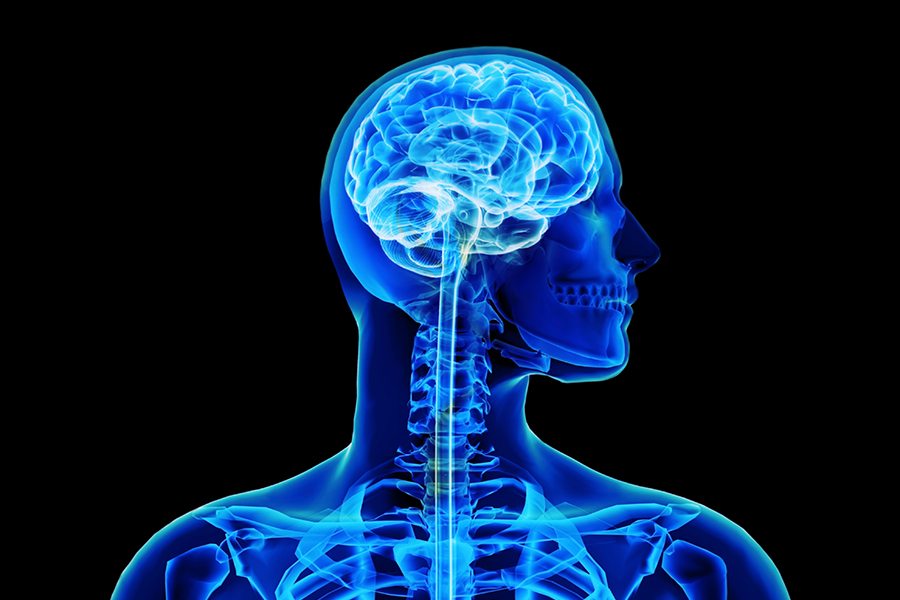The vagus nerve is one of the longest and most important nerves in the body and helps control a number of crucial functions.
It connects your brain to your gut, and can affect everything from your mood and stress levels to your digestion, heart rate and immune response.
It may also play a major role in inflammation and various chronic diseases if not working properly.
Here, we discuss what the vagus nerve is, what it does, and how stimulating it may be beneficial for both your physical and mental health.
What is the Vagus Nerve?
The Vagus Nerve Explained in Plain EnglishThe vagus nerve sends sensory information to the brain (like info about sights, smells, tastes and sounds), and controls certain motor functions throughout the body,
It’s the longest of 12 cranial nerves, and is referred to as cranial nerve X (or 10). There are actually two vagus nerves—the left and right—but both are often talked about as one.
In Latin, the word “vagus” means “wandering.” It’s an apt name, given that the vagus nerve wanders through the body, from the brainstem to the heart, lungs, stomach, digestive tract, liver, kidneys and spleen.
It works within the parasympathetic system, which is responsible for the “rest-and-digest” response. Within this system, it regulates internal organ functions, like digestion, heart rate and respiratory rate, as well as reflex actions like gagging, sneezing and swallowing.
But it does a whole lot more as well. Below, we’ll get into more of the vagus nerve’s many crucial functions.
Vagus Nerve Functions
Vagus Nerve FunctionsThe vagus nerve communicates with organs in the body via motor and sensory impulses.
Signals run up and down the vagus nerve. They tell your brain when you’re hungry or full, signal the muscles in your stomach to start the digestion process (peristalsis), slow down your heart rate, and activate your inflammatory stress response, among many other crucial functions.
The vagus nerve is also intimately involved within the microbiome-gut-brain axis, and even allows the microbes in the gut to directly communicate with the brain. Having a “gut feeling” stems from this connection.
Here’s more on how the vagus nerve impacts various organs in the body, from the brain to the gut.
Brain
Among its many duties in the brain, the vagus nerve affects mood, is involved in making and storing memories, and is essential for social bonding and human connection.
When people speak of the mind-body connection, they’re talking a lot about the vagus nerve’s influence on physical and mental health and how they interconnect.
The vagus nerve has been shown to be linked to major psychiatric conditions, such as depression and anxiety. Some of this may have to do with its relation to the gut bacteria, which can affect mood, partly by activating the vagus nerve.
A strong vagus nerve helps manage the body’s response to stress by regulating the heart and respiratory rate, which can also influence mood and anxiety.
There’s a growing amount of evidence that stimulating the vagus nerve may be an effective treatment for severe depression and bipolar disorder. Vagus nerve stimulation (VNS) devices were approved by the FDA back in 2005 and are still used today for conditions like depression and epilepsy.
Research shows that it may also be involved in the making and storing of memories. One study found that stimulating the nerve strengthened the memory of a group of rats by releasing the neurotransmitter norepinephrine.
Similar studies done on humans have concluded that VNS could offer promising results for conditions like Alzheimer’s disease.
Beyond mental health and memory, the vagus nerve also helps us see, hear and talk, and is essential in human interaction. In fact, it’s the root of a theory called the social engagement system.
Part of this theory relates to the ability to make you feel more calm when engaged in non-threatening eye contact and to filter out background noise in order to tune in to other people’s voices. It also affects the muscles in the face and larynx (voice box) to control your facial expressions and vocal tone.
Heart and Lungs
One of the vagus nerve’s most crucial functions is controlling your heart rate with electrical impulses and a neurotransmitter called acetylcholine, which helps slow the heart rate down.
This neurotransmitter, which is released by the vagus nerve, also allows your lungs to breathe.
The vagus nerve affects blood pressure as well. In one recent study, low levels of VNS improved hypertension (high blood pressure) in rats. Elsewhere, researchers have found that similar stimulation could even reduce rates of heart failure.
Gut
Along with connecting the brain to the gut, the vagus nerve also works directly in the digestive system.
It gets the muscles moving in your stomach (peristalsis) and increases stomach acidity and gut flow to promote healthy digestion.
Also, that feeling of satiety and satisfaction you experience after a meal is partly due to the activation of the vagus nerve.
Other Organs
The vagus nerve plays important roles in the liver, pancreas, gallbladder, kidneys and spleen as well.
It helps balance blood glucose levels, release bile in the gallbladder, and aid in the secretion of sodium from the kidneys.
On top of all that, it’s also shown to have potent anti-inflammatory effects throughout the body. This has led researchers to believe that VNS may be important in reducing inflammation and treating and preventing many chronic diseases.
Vagus Nerve Disorders
Vagus Nerve DisordersSince the vagus nerve runs throughout much of the body and impacts so many areas, damage or dysfunction to it can trigger a variety of symptoms, including:
Loss of gag reflex
Hoarseness, whispering or nasal voice
Difficulty swallowing (dysphagia)
Heart arrhythmia (irregular heart rate)
Change in blood pressure
Decreased production of stomach acid
Esophageal motility disorders (like acid reflux or GERD)
Anxiety
Depression
Irritable bowel syndrome (IBS)
Gastroparesis (delayed gastric emptying)
What symptoms you experience may depend on what part of the nerve is affected and the activity and strength of the vagus nerve, referred to as vagal tone.
Most of the above symptoms are due to underactive nerve activity (or a low vagal tone), but sometimes the vagus nerve can be overstimulated.
For example, the vagus nerve can overreact from certain forms of stress, like being exposed to extreme heat, seeing blood or experiencing emotional distress or fear. This can cause a sudden drop in heart rate and blood pressure and lead to vasovagal syncope (fainting).
Summary: Damage or dysfunction to the vagus nerve can trigger a variety of symptoms, including changes in heart rate and blood pressure, anxiety, depression and IBS. Most symptoms are due to underactive nerve activity (or a low vagal tone).
Vagus Nerve Testing
Vagus Nerve TestingTo test the function of the vagus nerve, a doctor will check your gag reflex by tickling the back of your throat.
If you don’t gag, it may be due to a problem with the vagus nerve.
To measure your vagal tone, or the strength of your vagus response, doctors can track biological processes like your heart rate, breathing rate and heart rate variability (HRV).
HRV measures the ability of the body to activate the parasympathetic “rest-and-digest” response. In general, the higher your HRV, the higher your vagal tone, which has been correlated with better cognitive performance, emotional regulation, social functioning and overall health.
Essentially, it means that your body is better prepared to adapt to stress and a variety of situations.
On the flipside, low HRV and a low vagal tone may mean your body is slower to recover. It’s also been associated with chronic inflammation, which is linked to most chronic diseases, including cancer, cardiovascular and neurodegenerative diseases and more.
This is why stimulating the vagus nerve can be effective in treating an array of health problems.
Summary: A doctor can check your gag reflex to test the function of the vagus nerve. To measure your vagal tone, or the strength of your vagus nerve, doctors can track your heart rate, breathing rate and heart rate variability (HRV). In general, a higher HRV is associated with a higher vagal tone and better overall health.
Vagus Nerve Stimulation
Vagus Nerve StimulationVagus nerve stimulation continues to be a growing area of interest for researchers, as it may help treat a wide range of conditions, including depression, multiple sclerosis, Alzheimer’s disease, migraines, hypertension and obesity.
Electronic stimulators, referred to as VNS devices, deliver electric impulses to the brain via the vagus nerve. As mentioned above, these have already been approved for use in depression and epilepsy.
But there are also many ways you can stimulate the nerve on your own. Below, are some proven techniques.
- Cold Exposure
Exposing yourself to cold temperatures can activate the vagus nerve and also lower your “flight-or-fight” response.
Try it out by splashing cold water on your face, taking a cold shower or heading outside on a chilly day without a jacket. Over time, you may find you can handle the cold better.
- Breathing Exercises
Deep and slow breathing has been shown to stimulate the vagus nerve, improve HRV and induce a sense of calmness.
Take a deep inhale, filling up your lungs with air as your belly expands, before slowly exhaling. Aim to take about 5-6 breaths per minute.
- Yoga, Tai Chi and Qi Gong
Yoga has also been shown to stimulate the vagus nerve, and may be more effective than walking in increasing the activity of the parasympathetic nervous system.
Adding in rhythmic slow breathing (with similar inhale and exhale times) while doing yoga may enhance the effect even more.
Other mind-body practices like tai chi and qi gong can have similar effects.
- Singing, Chanting, Humming and Gargling
As mentioned earlier, the vagus nerve works with the muscles at the back of your throat.
Activating these muscles via singing, chanting, humming or gargling will stimulate it and increase HRV. Singing in unison, like in a choir, can have an even greater effect.
You can also add OM chanting to your yoga or meditation practice to stimulate it further.
- Meditation and Positive Social Connections
Meditation can also increase vagal tone and positive emotions, especially via a technique called loving-kindness meditation (LKM).
This type of meditation focuses on positive social connections and feelings of love, compassion and goodwill toward yourself and others.
- Laughter
Laughter will make anyone feel good, and the vagus nerve likely plays a part in this.
In fact, one side effect of VNS is laughter itself. In rare cases, even too much laughing can cause fainting from overstimulation of the nerve.
In general, though, laughter has been shown to increase HRV and mood.
- Exercise
Mild exercise can influence the vagus nerve to stimulate gastric motility or gut flow to enhance the stomach’s ability to process food.
Interval training at moderate intensity may also increase its activity post-exercise.
- Massage & Acupuncture
Applying pressure to certain areas via techniques like massage and acupuncture has been shown to stimulate the vagus nerve.
This was observed as early as the 1880s, when it was found that manual massage and compression of the carotid artery in the neck could suppress seizures.
Foot reflexology can also activate the vagus nerve, increase HRV and lower blood pressure.
Acupuncture has a similar effect, especially using acupoints in the head, ears and neck.
- Probiotics
Feeding the “good” gut bacteria with probiotics may be beneficial for both the brain and gut by means of the vagus nerve.
Newer research is starting to support this theory, especially when it comes to reducing anxiety and depression. The nerve serves as a conduit in communicating signals between the gut bacteria and the brain.
Probiotic strains like Lactobacillus rhamnosus and Bifidobacterium longum have been shown to reduce stress and depression, while bad bacteria induces anxiety-like behavior in mice. All of this happens via the vagus nerve.
Other probiotic strains have also been shown to stimulate the vagus nerve and relieve stress symptoms in both human and animal models.
- Omega-3 Fatty Acids
EPA and DHA, the omega-3 fatty acids found mainly in fish, have been linked with an increase in HRV and activity of the vagus nerve.
Both consumption of fish and supplementation with fish oil has been shown to have beneficial effects on the nerve and, consequently, the brain and heart.
Summary: Vagus nerve stimulation has been shown to be effective in reducing symptoms of various conditions, including depression, Alzheimer’s disease, obesity and more. It’s possible to stimulate the vagus nerve on your own by exposing yourself to cold temperatures, breathing exercises, yoga and meditation, singing and chanting, exercise, laughter, massage, and consuming probiotics and omega-3 fats.
Why the Vagus Nerve is So Important
The vagus nerve runs from the brain to the gut and helps or controls numerous functions throughout the body.
As part of the parasympathetic system, it allows the body to “rest and digest,” meaning it’s necessary to enable your body to better respond to and recover from stress.
Of its many functions, the vagus nerve regulates digestion, heart rate, respiratory rate and more.
It also plays a large role within the microbiome-gut-brain axis by sending signals between the gut and brain via gut bacteria.
As we begin to understand more, the idea of the mind-body connection becomes more clear.
This means our physical and mental well-being are intimately interwoven, and the vagus nerve is a large reason why.
Any damage or dysfunction to it can affect your mood, digestion or cardiovascular system.
This is associated with low vagus nerve activity, or low vagal tone, which has been linked to chronic inflammation as well.
Fortunately, this can be improved via VNS.
In fact, an increasing amount of research has found that stimulating the nerve can help reduce symptoms of various conditions, including depression, Alzheimer’s disease, obesity and more.
While there are electrical VNS devices, there are plenty of ways you can stimulate your vagus nerve, via breathing exercises, yoga, meditation, singing, laughter, massage, consuming probiotics and omega-3 fats, and even just taking a nice, cold shower.
Such practices can help you control stress, improve your mood, help prevent numerous chronic diseases and even better connect with your fellow human beings.
Don’t believe it? Just splash some water on your face, take a few slow, deep breaths and see how much better you feel already.
This story originally appeared at DietVsDisease.com

Zenfull Living is a portal of life-friendly information moving us into an alternative reality of all things natural and life-sustaining.

